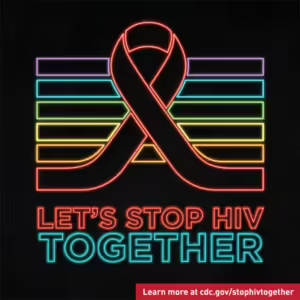Honoring Diversity and Health: Pride Month Resources for HIV Prevention and Care
Posted June 21, 2024 As we celebrate Pride Month, Pacific AETC reaffirms our unwavering commitment to supporting the LGBTQ+ community. This month, we honor the vibrant and diverse identities within this community while acknowledging the disproportionate impact of HIV and the ongoing challenges of stigma and access to care.
As we celebrate Pride Month, Pacific AETC reaffirms our unwavering commitment to supporting the LGBTQ+ community. This month, we honor the vibrant and diverse identities within this community while acknowledging the disproportionate impact of HIV and the ongoing challenges of stigma and access to care.
We are proud to share resources aimed at reducing HIV stigma, promoting inclusive care, and providing crucial information on preventative measures like PrEP. Together, we can create safe and affirming spaces where everyone can access the care they need to live healthy, authentic lives.
Explore the links below for resources and more information dedicated to helping the LGBTQ+ community receive comprehensive and affirming care.
On Demand Learning
Recorded E-Learning Course: Trans Health: Addressing the Healthcare Needs of Transgender and Gender Non-Binary Communities
This interactive presentation is designed to increase provider capacity to deliver culturally relevant health and wellness services to transgender communities and establish positive working relationships with transgender and gender non-binary clients and colleagues.
HIV Learning Network — Intersections of Gender-Affirming Care and HIV: What Is Gender-Affirming Care, and How Can I Incorporate It Into My Practice?
This presentation was given on June 13 @ 12:00 pm (Pacific): Intersections of Gender-Affirming Care and HIV: What Is Gender-Affirming Care, and How Can I Incorporate It Into My Practice?, by Giselle Levin, PsyD, Clinical Psychologist, Child and Adolescent Gender Center, UCSF Benioff Children’s Hospital.
Description: Transgender people, particularly transgender women, are among the groups most disproportionately affected by HIV. Many transgender people face stigma, discrimination, social rejection, and exclusion that can prevent them from accessing healthcare, including HIV prevention. Insensitivity to transgender-specific health needs by providers can be a significant barrier for transgender people with HIV seeking quality treatment care and services. (CDC) In this session, Dr. Giselle Levin will provide an overview of what gender-affirming care is and how creating a safe place to access healthcare services can improve the mental health and well-being of transgender people. We will learn how we can help transgender people prioritize HIV care and prevention for themselves when we meet a person’s gender-specific healthcare needs.
HIV Learning Network — Supporting LGBTQ+ and HIV+ Military and Veteran families using the Whole Health Model
This presentation was given on November 9 @ 12:00pm (Pacific): Supporting LGBTQ+ and HIV+ Military and Veteran families using the Whole Health Model, by Caitlin Hildebrand, MSHAIL, MSN, AGPCNP-BC, Clinic Director, Integrative Health, San Francisco VA, and University of Colorado DNP Student in Veteran and Military Healthcare
Description: Acceptance of LGBTQ+ people serving in the military in the US has evolved over the last 35 years, as has HIV prevention and care of active service members and veterans. To commemorate Veterans Day (November 11), We’ve invited Caitlin Hildebrand, MSHAIL, MSN, AGPCNP-BC, from the San Francisco VA Medical Center to provide a brief history of the rules and laws that have affected LGBTQ+ service members, veterans, and their families, and consider how current laws both provide support and pose challenges to their wellbeing. She’ll review the scope and role of HIV care and prevention in the US military and the VA, and review the Whole Health model of patient-centered care at the VA to better support family safety and wellbeing for people with HIV and LGBTQ+ communities.
HIV Learning Network — Transgender Psychiatry
This presentation was given on September 14 @ 12:00pm (Pacific): Transgender Psychiatry, by Lukmanafis Babajide, MD, Clinical Psychiatrist and Director of LGBTQ Services, Mindpath.
Description: Transgender and gender diverse people face ongoing discrimination, stigma, and hardships that lead to health disparities, including increasing mental health issues and a higher risk of acquiring HIV. These disparities are compounded by the difficulty they face in finding comprehensive and gender-affirming health care. In this session clinical psychiatrist, Dr. Lukmon Babajide, will review these disparities and describe the mental health needs of people in the transgender and gender diverse communities. He will review considerations providers can make to create welcoming and gender-affirming spaces for people to increase engagement and retention in care.
Additional Resources:
Resources to Support HIV Prevention Programs for Transgender Women
NIH LGBTQ+ HIV Resource Directory
National LGBTQIA+ Health Education Center
CDC Let’s Stop HIV Together Resource Directory
